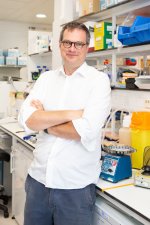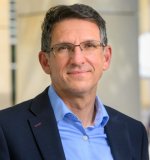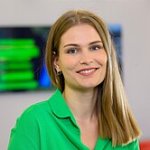Cracking the Genetic Code - Berlin
Cracking the Genetic Code - Berlin
Hear from Vice-Chancellor Professor Deborah Prentice, geneticist Professor Eric Miska (Head of the Department of Biochemistry and Herchel Smith Chair of Molecular Genetics), Professor Ludovic Vallier (Einstein Professor for Stem Cells in Regenerative Therapies at the Berlin Institute of Health) and colleagues as they discuss 'genetic codebreaking' and what it means for the future of cancer research, care and treatment. They'll explore the study of changes in gene activity, how environmental influences can affect the way your genes work, and the journey from medical breakthrough to patient bedside.
Don’t miss these fascinating and convivial opportunities to find out the latest from the University, and network with fellow Cambridge alumni and friends at our Global Cambridge events.
The evening will include drinks and canapes, and an opportunity to network with fellow alumni.
Schedule:
6.30pm - 7.15pm - Welcome reception
7.15pm - 8.15pm - Panel discussion with the Vice-Chancellor
8.15pm - 9.00pm - Canape and networking reception
Speakers
Professor Deborah Prentice

Professor Deborah Prentice became the University of Cambridge’s 347th Vice-Chancellor on July 1, 2023.
An eminent psychologist, Professor Prentice carried out her academic and administrative career at Princeton University, which she first joined in 1988. She rose through the academic ranks and took on administrative responsibilities of increasing scope, chairing the Department of Psychology for 12 years, serving as Dean of Faculty for three years, and then serving six years as Provost, with primary responsibility for all academic, budgetary, and long-term planning issues.
Her academic expertise is in the study of social norms that govern human behaviour – particularly the impact and development of unwritten rules and conventions, and how people respond to breaches of those rules. She has edited three academic volumes and published more than 50 articles and chapters, and she has specialised in the study of domestic violence, alcohol abuse and gender stereotypes.
The University Council nominated Professor Prentice for appointment as Vice-Chancellor in September 2022.
Professor Eric Miska (King’s 1996)

Professor Eric Miska is Head of Department at the Department of Biochemistry, University of Cambridge, where he is the Herchel Smith Professor of Molecular Genetics. He is also Associate Group Leader at the Gurdon Institute at the University of Cambridge and Fellow in Molecular Biology, St. John's College.
Professor Miska’s cutting-edge research focuses on the huge impact of tiny molecules in our cells called micro RNAs.
Micro RNAs act as ‘molecular switches’, controlling which genes in DNA are turned on or off. This layer of instructions sits on top of our genetic code and can also affect when and how cells multiply. Because cancer is a disease of uncontrolled cell division, scientists think that micro RNAs could play an important role in the disease.
Professor Miska and his team are unravelling exactly how micro RNAs are produced, how they switch genes on and off, and - crucially - how this process goes wrong in cancer.
This exciting research will pave the way for new treatments for cancer and point towards future methods to diagnose and monitor the disease.
Professor Ludovic Vallier

Professor Ludovic Vallier graduated in Molecular biology and Immunology from the University Claude Bernard Lyon I in 1997. In 2001, he earned his PhD at Ecole Normale Superieur of Lyon studying mechanisms that control the cell cycle in mouse embryonic stem (ES) cells. Following a year in the biotechnology industry, Ludovic joined Professor Pedersen's group at the University of Cambridge Department of Surgery. In 2008 he joined the newly opened Anne McLaren Laboratory for Regenerative Medicine (LRM) as a Principal Investigator and MRC non-clinical senior fellow.
Ludovic was Professor of Regenerative Medicine affiliated to the department of Surgery and manager of the National Institute for Health Research (NIHR) Cambridge Biomedical Research Centre hIPSCs (human induced pluripotent stem cells) core facility. He was co-deputy director of the Cambridge Stem Cell Institute in 2019, was elected as a Fellow of the Academy of Medical Sciences in 2020 and joined the editorial board of Stem Cell Reports as associated editor.
In parallel, he has been involved in the creation of several biotechnology companies including DefiniGEN, BiliTech and AcuLive Therapeutics. Ludovic now serves as Einstein Professor for Stem Cells in Regenerative Therapies at the Berlin Institute of Health (BIH) and Max Planck Fellow at the Max Planck Institute for Molecular Genetics (MPIMG). His group based at the BIH Centre for Regenerative Therapies (BCRT) employs human stem cells and organoids to study liver biology and to develop new cell-based therapies.
Katja Püstow

Katja Püstow earnt her Bachelor's degree in Biology from the Humboldt University of Berlin and her Master's degree in Molecular Biology from the Free University of Berlin.
She is now completing her PhD in the lab of Ludovic Vallier at the Berlin Center for Regenerative Therapies at Charité Berlin. Her project is interested in the role of cellular plasticity in human liver cancer, aiming to elucidate mechanisms driving tumorigenesis. This project could make a significant contribution to the understanding and potential treatment of liver cancer in a patient-personalized manner.
Tsveta Kamenova (Homerton 2016)

BA (Hons) Natural Sciences. CRUK Cancer Centre PhD Student in the Miska Lab, Department of Biochemistry. Interested in non-coding RNA function in lung cancer development.
Booking information
If you would like further information about this event, please email globalcambridge@alumni.cam.ac.uk.
Booking for this event is now closed.

